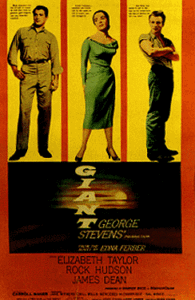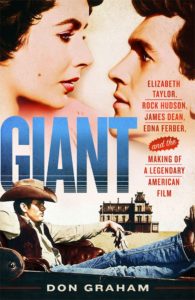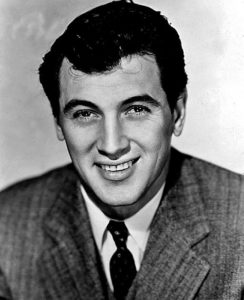WCAG Heading
by Don Graham
When George Stevens picked Rock Hudson to play rancher Bick Benedict in the big new film that everybody in Hollywood was buzzing about, the actor couldn’t have been happier. He was “walking in clouds,” he wrote Stevens in late November 1954.

It was a long road that led to Hudson’s selection. Stevens began casting near the end of 1953 and didn’t arrive at a decision on who would play Bick Benedict until a year later. Stevens went about the process with his usual thoroughness. He created a kind of Texas bazaar in his office at Warner Bros., with photographs and articles about Texas posted on the walls. He wouldn’t have any trouble finding materials. As Edna Ferber wrote, “Texas of the 1930s and 1940s was constantly leaping out at one from the pages of books, plays, magazines, newspapers. Motion pictures of Texas background were all cowboys and bang-bang, Texas oil, Texas jokes, Texas money billowed out of that enormous southwest commonwealth.” Ferber was right on all counts. Texas had been a movie state from the earliest days of film, going all the way back to 1908’s Texas Tex (shot in Copenhagen, Denmark!). In the run-up to Giant, Hollywood pumped out sixty-three films about Texas from 1950 to 1956, almost all of them shot on studio back lots.
Stevens, however, wasn’t sure how to represent the Texas type, and in October 1954, he placed a call to John Rosenfield, longtime arts critic of the Dallas Morning News. He thought Rosenfield might be able to help. “You know, I don’t know what a Texan looks like. I’m afraid that if I follow my ideas I will show types that Texans will hoot at.” What he wanted, he went on, was “a good portrait artist who will visualize six leading characters for me.” Furthermore, he added, “I want him to do this without any reference to established movie stars.”
Rosenfield knew just the man, Edward Bearden, a Dallas artist and former member of the SMU faculty. At Stevens’s bidding, Bearden drew the six key figures: rancher Bick Benedict; his wife, Leslie Lynnton; Jett Rink, the poor ranch hand who strikes it rich; Luz Benedict, Bick’s cantankerous sister; Uncle Bawley, a wise old bachelor; and Old Polo, the vaquero caporal (foreman). Stevens felt it was imperative to have a Texas perspective, and Bearden gave him that. Delighted with the sketches, Stevens posted them outside his office and distributed copies to casting agents and the press.

Stevens also valued Ivan Moffat’s incisive prose profiles of the principals in the story. Moffat’s insights into character and motive were striking. Typical is this probing analysis of Bick Benedict: “Perhaps deep down Bick had long known that some of his views were wrong and that Leslie was right in her point of view, but he never admitted it. He indulged to his own considerable satisfaction in unfavorable comments about the appearance of his half-Mexican grandson, and relished doing so all the more because he had a sneaking feeling that in actual truth the mixture of his blood would be a pretty good one.”
With Bearden’s drawings and Moffat’s verbal descriptions as guides, Stevens directed his search for actors along those lines. He preferred choosing actors instead of holding auditions. Having grown up in a family of actors, he knew the humiliations associated with auditions. And in casting Giant, he had an abundance of eager talent. Just about every leading man in Hollywood felt he was perfect for the role of Bick Benedict.
After all, most of them had already played Texans in one film or another. Clark Gable, Gary Cooper, Charlton Heston, William Holden, Robert Mitchum, Joel McCrea, Sterling Hayden, Errol Flynn, Robert Taylor, and Forrest Tucker—all had donned chaps and Stetsons, holstered their side- arms, mounted their trusty steeds, and ridden off to some studio backlot Texas town to save it from desperadoes waiting for a train.

And so the suitors presented themselves. They telephoned, they wrote, and they visited the Warner Bros. lot. Early hopefuls included Gable, Cooper, Holden, Mitchum, and Hayden. With all that talent around, Rock Hudson wasn’t even in the running in the beginning. But from Stevens’s perspective, all the other aspirants faced an insuperable problem. They were too old. The storyline of Giant covered twenty-five years and whoever played Bick Benedict would have to transition from a young man courting a young woman to a graying middle-aged grandfather. For established male stars, it was a canyon too far.
Stevens believed it was easier to age a younger man than to make an older one appear younger. And he most certainly did not want to use two actors to convey the sense of aging.
Among the actors that Stevens did consider in the beginning are a few surprises. He briefly entertained the idea of Forrest Tucker, a rugged six-foot-four action star in not-so-great Westerns. The lead in Giant would have been a bigger boost for his career even than it was for Hudson.
Budgeting problems expanded the range of possibilities. Already worried about cost overruns, Warners had the studio casting department draw up a list based on box-office appeal. With John Wayne at the top, the roster included sixteen names, among them Jimmy Stewart, Henry Fonda, and Jeff Chandler. Some seem very implausible: Victor Mature and Cornel Wilde, for example. Edna Ferber’s favorite, Burt Lancaster, was never considered.
For a time, it appeared that Sterling Hayden might have the inside track. His agent lobbied hard for Hayden: “He has the great robust charm these ‘Texians’ seem to have,” but there again was the question of age. The agent thought that with a little makeup and the right clothes, his client could pull off the younger Bick Benedict. But Stevens rejected this argument: “It’s easier to believe a romance between young people than among older, more established stars.”
Gradually, Rock Hudson emerged as the pick.
Don Graham, whom the Dallas Morning News has called “Our premier scholar and critic on Texas literature, films and pop culture,” is J. Frank Dobie Regents Professor of English at the University of Texas at Austin. He is also a writer-at-large with Texas Monthly magazine. He received the Carr P. Collins Prize for Best Nonfiction Book of the Year, awarded by the Texas Institute of Letters, and has served as that organization’s president.
Don is the author of Kings of Texas and Giant.
